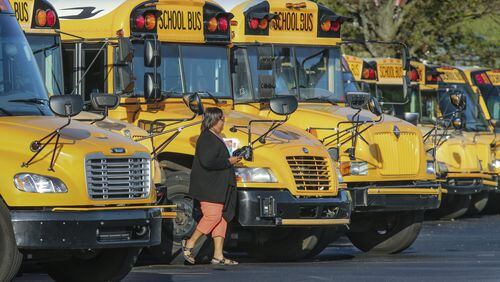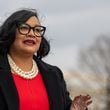Kimberly Wright said seeing a different driver for her son’s school bus Thursday morning raised red flags immediately.
Mr. Autry, the regular driver, is trained to give seizure medication to her 7-year-old, Javonte, should the need arise on the way to Peachcrest Elementary School in Decatur. Coming to the bus stop that morning, she wasn't aware of the planned sickout that saw nearly 400 drivers call out of work that morning.
“This person wasn’t trained, and there was no plan for if my son were to get sick,” she said.
Wright was among many parents both frustrated by the sickout but standing with drivers who sat out over concerns over how much they make — and how they are treated as they deliver nearly 70,000 students to and from school each day.
“I’m not upset with the drivers,” Wright told The Atlanta Journal-Constitution. Superintendent Steve Green “allowed this to go on. These people didn’t just up and make this decision that day.”
Factors contributing to driver complaints aren’t unique to DeKalb, and DeKalb’s drivers said they hoped speaking out would galvanize drivers in other districts.
Green, in a letter Monday addressing the sickout that resulted in at least seven terminations, reiterated that his drivers are among some of the highest paid in metro Atlanta, and said progress is being made on a list of dozens of concerns, from overcrowded buses to massive potholes at bus depots, recently brought to his attention.
“We’ve found a healthy and productive way for moving forward,” Green said Wednesday. “We as adults are coming together in the spirit of collaboration … and students are not being caught in the crosshairs.”
Beginning bus drivers make $17 per hour in DeKalb County. But some drivers said they lost more than other district staffers as transportation funding was felled by several variables, among them the Great Recession and the state not fully funding its share.
“I know I made more then than now,” said Sheila Bennett, who started with the district 11 years ago.
Bennett, who had pushed recently for steps to address drivers’ concerns, was terminated for her part in the sickout. A grassroots campaign supporting the drivers — led by the Atlanta branch of the General Defense Committee, which supports unionizing efforts — is underway to get DeKalb Schools officials to reinstate several drivers who were fired.
The district said in a statement that added costs were minimal during the sickout, as buses were driven by substitute drivers, supervisors and managers certified to drive school buses.
“The ultimate cost to the district during the sickout was the risk to the safety of students when buses were delayed due to the drivers that did not come to work,” the statement said.
Green’s Monday letter noted monthly meetings with the Driver and Monitor Advisory Committee, which includes transportation staffers charged with raising transportation staff concerns. Green met with a group of about 400 bus drivers on April 17 and extended an invitation for a meeting with Bennett, then the committee’s leader, on the first day of the scheduled sickout. District officials said that invitation was declined.
Green met instead with a group of drivers Thursday and the drivers prioritized issues. He said a timeline is being developed to address those issues. Another meeting with that group is scheduled Thursday. The district cited five raises its bus drivers received in the past five years, ranging from 1.12 percent in 2014 to 5.07 percent in 2017. Drivers also were moved from 5-hour to 6-hour workdays.
Nationally, the same issues have affected recruitment efforts. “It’s hard to even recruit new drivers because of the pay, method of pay and conditions,” said Tiffany Boykin, executive director of the National School Transportation Association. “No matter what state it is, the issue is the same.”
Gwinnett County said at the beginning of the year it lost a significant number of new drivers almost immediately, mostly because improved economic conditions opened better job options elsewhere.
DeKalb drivers told Green and the school board in March about unruly students and parents, inadequate hours, and not having a retirement plan/ They had complained about some of the same issues two years earlier.
“I don’t know if we ever get back where we were” on pay and benefits, Green said. “History shows we’re seeking … progressive and aggressive effort to recapture as much as we can what was lost in the past. And that’s not just unique to bus drivers.”
Claire Suggs, a senior education policy analyst with the Georgia Budget and Policy Institute, said cuts to the state's education contributions have forced school districts to rethink how they fund programs and salaries. In February, Gov. Nathan Deal pushed to end a school funding deficit after more than a decade of austerity cuts. For transportation, state funding once covered half the districts' costs; now, the state covers about 15 percent.
The state also is not funding transportation according to its formula, she said. “Districts earned a little over $300 million, but the state provided $131 million of that.”
The state also ended its health care contributions for nonteaching staff. Suggs said districts have vocalized concerns about not being able to invest in training or add bus monitors, who keep an eye on riders. Bus drivers often cite student behavior among their safety concerns.
Buses and parents filtered through Chapel Hill Middle School smoothly Tuesday, but 32-year-old Shana Jones said Thursday, the day the sickout began, was a different scene. Jones said she waited 30 extra minutes to pick up her two sets of twins, two children in sixth grade and the other pair in seventh.
“People were out here cussing and getting aggravated,” she said of the parents who were pick-up line amateurs.
Usually able to pick out her four children, she couldn’t find them in the sea of backpacks Thursday and needed a security guard to get on a bullhorn to locate them.
After working 39 years at Coca-Cola, Angelo Dixon is retired, which has freed up plenty of time for him each day to drive his blue Ford F-150 to Tucker Middle School to pick up his grandson. Some students are not as fortunate.
Because of the sickout, he said, the line for car riders at Tucker Middle has grown longer this week, causing delays in traffic and leaving many kids in front of the school looking for a familiar car.
Dixon, 73, said the drivers could have gone about their protest in a better way.
“They should’ve gotten organized,” Dixon said. “Sometimes it ain’t what you do, but how you do it. There’s so many cars out here now, it’s hard for some school buses to get in.”
Phillip Floyd left work early to pick up his sixth-grade son from Miller Grove Middle last Friday. The bus his son usually rides to school didn’t come that day. Floyd’s wife had already changed her schedule to take their son to school that morning.
Floyd is considering picking up his son most days from now on.
When the school notified parents of the sickout last week, Floyd was not surprised.
“That’s probably the only way the drivers could get heard,” he said sitting in his truck waiting for his son Tuesday afternoon. “I’m sure they had tried other ways before resorting to this.”
THE STORY SO FAR
DeKalb County School District bus drivers said their concerns have largely gone unheard for years about low pay, no recognition and overcrowded buses.
Nearly 400 drivers stayed home from work Thursday as part of a sickout, urging district administrators to act on their concerns. Seven drivers were terminated for promoting the sickout, district officials said.
By Monday, the sickout’s last day, about 60 drivers were absent, with little route interruption. Superintendent Steve Green said conversations are ongoing to address drivers’ concerns.
Starting Salaries
Fulton - $16.48, minimum five hours per day
Atlanta Public Schools - $17.67, minimum four hours or five hours per day
Gwinnett County Public Schools - $15.08, minimum six hours per day
DeKalb County Schools - $17, minimum six hours per day
Cobb County Schools - $15.62, minimum six hours per day
DeKalb County School District bus drivers currently are the second-highest paid among metro Atlanta bus drivers by hourly rate (behind Atlanta Public Schools’ $17.67) of pay.
About the Author







